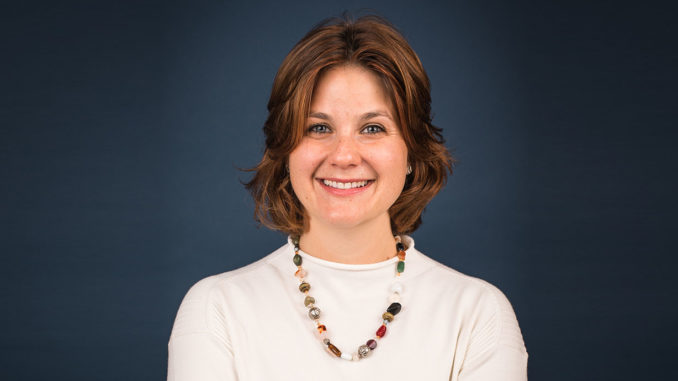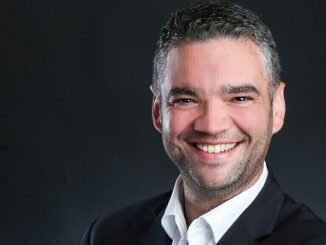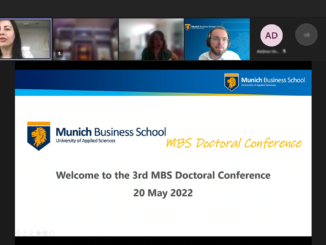
In 2016, Judith Widauer enrolled in the part-time Doctor of Business Administration program at Sheffield Hallam University, for which Munich Business School provides targeted preparation with two modules – five years later, she has her doctorate in the bag. In the interview, the graduate talks about her motivation for the doctorate, gives a deeper insight into her DBA journey as well as her research project in talent management, and shares useful tips for future DBA students.
MBS Insights: Dear Judith, first of all, congratulations on your promotion! Why did you choose the DBA program at Sheffield Hallam University and Munich Business School?
Dr. Judith Widauer: I had been following this DBA program on different channels for a while. I decided for it because I wanted to write, and to grow personally and professionally; I felt that the curriculum offered a thought-through combination of fixed elements and flexibility: I was drawn to the part-time structure of the program and intrigued by the taught modules.
MBS Insights: What was your DBA journey like? What were important milestones?
Dr. Judith Widauer: After the very first module, a DBA friend and I compared the DBA to travelling: when travelling, each encounter in the journey adds value and widens horizons. This comparison is still valid, and I have very much enjoyed all activities. It was sort of a hobby for me and I enjoyed investing time into it, it felt like “time for myself”. Every module, every discussion and every encounter with study peers was rewarding – I would not want to miss that! The most important milestones are however surely related to the thesis itself: getting the research project approved, exploring and interpreting the results of the field research – the moment of relief when looking at the findings, writing up and having the final check-in with the supervisors, and naturally the viva which is the oral examination undertaken by experts in the field.
MBS Insights: How did you come up with your research topic? And to what extent did it evolve over time?
Dr. Judith Widauer: It was definitely a process. At the beginning, I would explore the literature to gain an understanding of the research area and to identify gaps from previous work. In addition, I realized over time that to be personally connected to the research is a key element of success for me. This means that the business problem I ultimately researched evolved from my own experience and reflection in the workplace.
MBS Insights: To what extent was the supervision offered by the MBS and SHU professors helpful for your progress?
Dr. Judith Widauer: My supervisors and supporters along the way inspired, encouraged and gave guidance and practical support whenever needed. I experienced having supervisors from different countries and universities as beneficial because it provides insights into different perspectives. I enjoyed our discussions very much and I am thankful that we now continue working together.
MBS Insights: We know you had a baby during your DBA journey and then there was also the COVID-19 pandemic. How did you manage the balancing act between work, family, and DBA?
Dr. Judith Widauer: With a firm plan in mind for the remainder of the doctoral journey, our baby turned my life upside down. Although I somehow integrated the doctoral studies into the daily routine with the baby (e.g. taking voice notes during walks), I encountered various challenges that come with the early stages of being a mother. I still perceived the DBA as a hobby and “time for myself” but life naturally became complicated, also with the Corona pandemic. I had different roles, needs and emotions to balance. How did I manage? In hindsight, I am not sure, but I know that a lot of credit goes to my husband and family.
MBS Insights: How has the DBA program advanced you personally and professionally? What are your future plans?
Dr. Judith Widauer: During the DBA journey, I constantly reflected on how the research affects me personally and professionally. Indeed, the notion of reflective practice is a major learning which I can apply in the workplace. I also found that the academic environment is inspiring and helps me grow as a person. As for my future plans, I take the learnings with me and apply them in the workplace.
MBS Insights: And to conclude – what tips can you provide for further DBA students?
Dr. Judith Widauer: Reflecting on this question, I decide on four rather practical tips:
- Enjoy the group: Engage in discussion, reflect together and go on fun outings; in our cohort, we had a really good time and I remember one very special ski excursion after one of the taught modules in Munich.
- Make a plan: I made regular schedules with a realistic time horizon of 1.5-2 months; in doing so, I had goals that also motivated me. Every two or so weeks, I could check task boxes which is of course a rewarding experience in itself. Funny enough, I was almost surprised when I then came near the end of the doctoral journey because I had always focused on rather short-term goals.
- Find your personal source of motivation: Next to making plans, I am for example motivated by giving commitments in writing (email) to my supervisors, e.g. to deliver a chapter until a certain date. But the “recipe” can be different for every one of us.
- Do something different from work: Working in the field of digitalization, the “different way” for me was a paper-based approach – I used a non-digital research diary for note-taking and my schedule, and enjoyed writing into it. I also used different laptops for the DBA and for my job. I always tried to see the DBA as a hobby, pointing out the distinction between work and the DBA as much as possible, even if only for me to see.

Would you like to scientifically research a current economic issue within the framework of a doctorate without having to leave your professional career?
The part-time Doctor of Business Administration (DBA) program at Munich Business School and Sheffield Hallam University (SHU) is just right for you! See for yourself: Doctor of Business Administration



